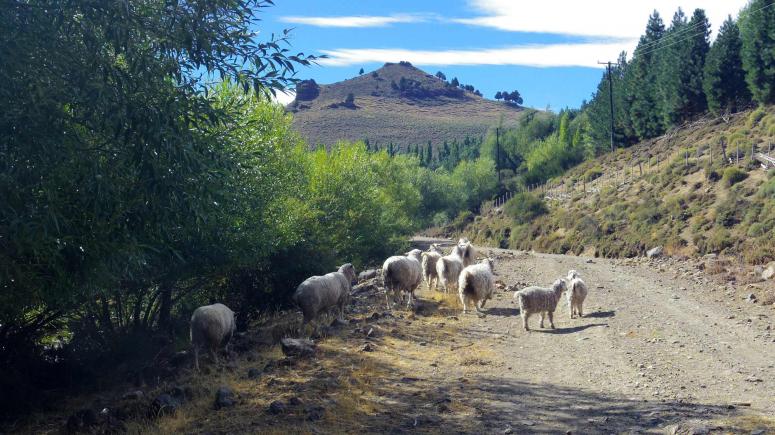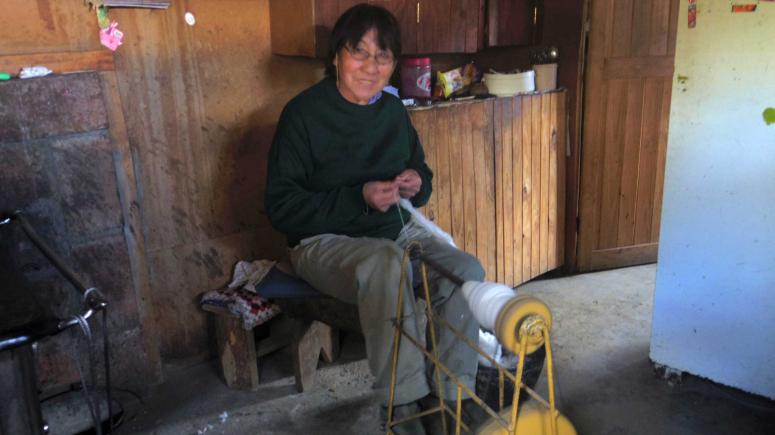
A collaborative publication of the Latin American Studies Program
Divisadero
Fall 2015
Silveria
This is a narrative based on excerpts from a diary that I kept while studying abroad in Argentina—some entries were written in Spanish and some in English. I completed an educational excursion organized by SIT (School for International Training) from February to June 2015, in Neuquén, in west Argentina.
We sit in Silveria’s tiny kitchen in silence, with only the hum of her beat-up refrigerator. She weaves while I write. We sit in this comfortable silence without needing to fill it. The program directors warned us about this silence before we arrived in the Mapuche community. They said there would be a lot of it often. It will be awkward they said, just prepare for it. I was lucky to get Silveria as my host mom. The lines and wrinkles on her face tell me que ha vivido mucho but I cannot pinpoint how old she is, she is ageless to me. This strong determined hurricane of a woman speaks her mind with painful honesty. She spent too much time keeping quiet for an alcoholic husband. She was always scared of him. She never spoke out of place about anything much less about his drinking. That is until the day she left him.
She tells me about Mapuche marriage, how it’s not a marriage like I think of it. They do not have a piece of paper that establishes a marriage; instead—at least before in the times when she was younger—the husband speaks with the parents and agrees to an arrangement. Her dad asked for a couple goats when she was supposed to marry, but this infuriated young Silveria. She threatened to run away from home and not marry if he tried to sell her “like an animal”. She defied her father and succeeded, at least partly, she married the man he wanted but made sure there was not a single cent exchanged.
She doesn’t tell me much about how she left her husband, and I decide not to prod. She only says it took her longer than it should have.
In preparation for the trip we were assigned literature about Mapuche erasure from Argentine history, the Mapuche struggle for territory and the modern changing role of women in leadership. Apart from the academic guidance about the community’s history I was not really sure what to expect about the homestay. I guess not having preconceptions was the right decision because I never could have imagined Silveria and how easy it is to skip pleasantries and speak to each other the way one does to close friends.
Our conversations begin light-hearted, we talk about culture, hers then mine. We talk about religion mine then hers, I ask about the cross hanging in her kitchen and she tells me she is a devout Christian, Mapuche identity and her Christian faith coexist in her mind she says. I think about the terrible irony behind colonization reaching the mountains of Neuquen and into Silveria’s tiny kitchen walls in the form of this cross—la espada y la cruz. She tells me about the struggles of the community to find their ancestral connection to the land and to their culture.
We go back and forth like that until we start to discuss family. Silveria and I talk about sex and her 10 kids, she tells me she never wanted that to be her life, as much as she loves them. She never had a choice. She tells me when she was a young, condoms and birth control did not exist. At least not for her, not in the community. She tells me about how her eldest daughter moved-in with a man a few years ago. Silveria says she was happy for her daughter, but she was confused. How does one go about having a conversation about creating a life together? She cannot even picture what that looks like, she says. After she got pregnant she never had any choice as to where her life was going.
She is happy for her daughter. She is sad she never knew that kind of agency.
In preparation for this trip we’ve read about the role of Mapuche women in the community. Historically women have always been central to the community and to the struggle to reclaim Mapuche territory stolen from the Argentine government throughout time, but in the past it had been mainly through the private sphere from home. Increasingly women have become key actors in mobilizing for the recovery of territory; this was born out of the need to address certain issues pertaining to women. It is a movement to reclaim women’s ancestral role as producers of culture and tradition. To me Silveria and her story embody an aspect of this change.
Silveria makes this space feel like home. Her house built from brick and wood will fall down soon, she says. Her son is building her a new one, one made out of “real materials”—cement and concrete. She gifts me a jar of homemade jam and warm socks for the imminent Argentine winter. Although she says she doubts she will ever leave the life she’s built here I leave her with my email and home address in case she ever goes to Mexico. As much as I appreciate this tiny nirvana in the mountains I wish she had access to Internet so I could somehow see her again.
She walks with me to the elementary school in the community, where I am supposed to meet the rest of the group to leave. We walk in a comfortable silence, before arriving to the community the program directors informed us that culturally Mapuche people tend to be quiet. They warned more than once about the awkward silences we would experience. But this is not that, this is the ability to sit together without the anxiety of what to say next. This is the acceptance of empty spaces.



